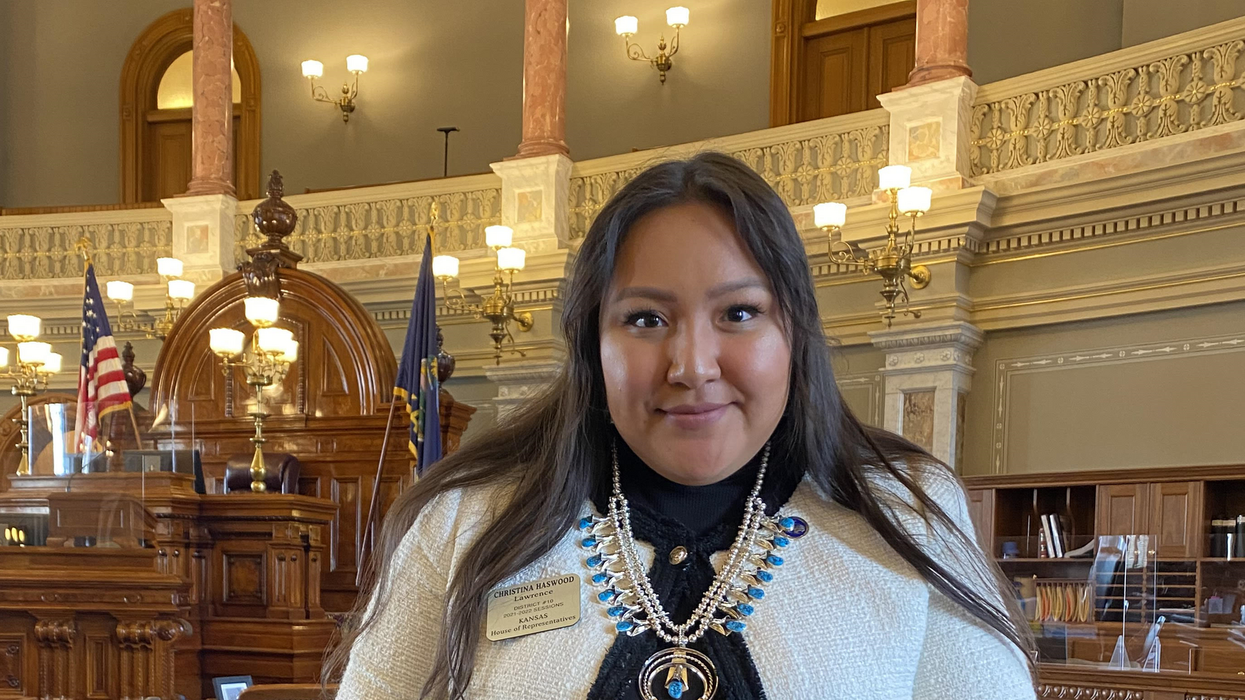Goldsmith is the senior communications director for The Future Caucus.
Growing up, Christina Haswood struggled with poverty, relying on public resources for housing, school lunches, and tribal clothing programs. Her upbringing provided a unique advantage in understanding the economic struggles facing many in her generation and disadvantaged constituents within the district she now represents in the Kansas House of Representatives.
Born in Lawrence, Kan., following her parent’s relocation from the Navajo Nation reservation in Arizona, Haswood’s journey is deeply rooted in her community. From her early education to the initial stages of her college career, Haswood’s continuous connection to the district, as well as her heritage, form the bedrock of her commitment to public service.
“When I got tapped to run for office, I had a lot of that community support, where folks have known me and seen me since I was toddler age,” Haswood, a Democrat, said in an interview at the Future Caucus’ 2023 Future Summit. “They see me, you know, go through sports, graduating high school and starting my adult life and higher education. It was really a great experience to have that community support.”
Haswood’s entry into politics was not merely a personal choice but a response to a collective call from her community. Encouraged by former state Rep. Ponka-We Victors and other women in the Native American community, she overcame initial doubt about her age and limited political experience to run for office.
“What convinced me was that I can bring representation to other Native American and BIPOC [Black, indigenous and people of color] folks in Kansas, that we belong in these spaces, and if I win or lose, I can still bring that little bit of inspiration that once was brought to me,” Haswood said. “That’s when I decided to throw my hat in the ring to run for office.”
With academic accomplishments including an associate degree in community health from Haskell Indian Nations University, a bachelor’s degree in public health from Arizona State University and a master’s degree in public health management from the University of Kansas Medical Center, Haswood brings a wealth of knowledge to her legislative role.
Running for office during the global Covid-19 pandemic, Haswood was compelled to act, witnessing its disproportionate impact on Indigenous populations. Seeing high mortality rates in the Navajo Nation hit close to home, with personal losses emphasizing the need for effective advocacy.
“The Navajo Nation had one of the highest mortality rates of a tribal nation experiencing Covid, and I have personally lost family members during that time as well,” Haswood said. “To see the argument that this pandemic and this health virus wasn’t taken seriously was really concerning to me. So, I knew I wanted to bring the advocacy that I had.”
As a representative of the younger generation, Haswood is attuned to the economic challenges faced not only in Kansas but nationwide. Housing and child care, often overlooked issues, resonate deeply with her, reflecting the unmet needs of her generation.
“There’s not a lot of space to talk about our millennial and Gen Z problems such as housing,” Haswood said. “I personally am still in an apartment, and buying my first house seems like a dream away for me, but [there are] also issues such as child care for my colleagues who do have families or are starting families. These issues have not been invested within our state for quite a while.”
Bipartisanship, according to Haswood, aligns with the desires of Kansans. Elected not for a rigid political ideology but for her commitment to collaboration, she emphasizes the importance of working across the aisle to address shared issues.
“We can all collectively say these are issues that we want to support, and we want to help Kansas,” Haswood said. “I think you’ll hear on both sides of the aisle that one of the things that we try to do is keep Kansans in Kansas, keep our young talent in Kansas, and support our young folks to plant roots and keep Kansas their home.”
In her pursuit of a more transparent political landscape, Haswood employs social media for accessibility and engagement. By demystifying the political process and making it more relatable, she seeks to draw more people, especially the younger demographic, into active participation in politics and governance.
“I try to use my social media as a tool that I feel like is accessible, usually to a lot of folks and to young people,” Haswood said. “To get them engaged, to spread the word and to lift and unveil that curtain a bit on politics, but also make politics seem fun and accessible. Because I think if we help put the system together to make it more accessible, more people would be able to participate.”
Haswood’s journey from a challenging upbringing to a prominent position in the Kansas Legislature not only inspires hope, it underscores the importance of diverse voices in shaping a better future.



















Trump & Hegseth gave Mark Kelly a huge 2028 gift